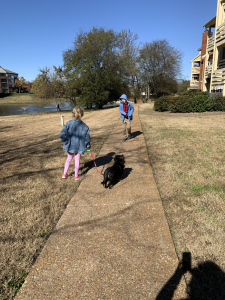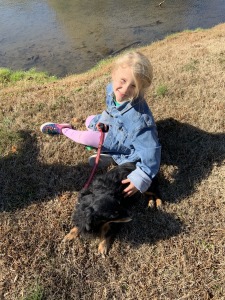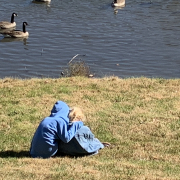Is grandparenting is a joy like no other? Just ask a G., but only if you have plenty of time on your hands, because chances are you won’t get away quickly. In the age of social media, you could choke on all the evidence, drown in endless photos of beautiful small people indulged by Gs at opulent birthday parties, proud Gs in worshipful attendance at school sporting events, and on it goes. Great stuff, we are meant to think, and in most cases, it’s probably true.
Here’s another fact you won’t see in those photos: Sometimes grandparenting is really, really hard. You probably can’t spot it next to Mickey Mouse at Disney World or inside the travel camper, but this G-ma had to admit it to herself the other day, just the same.
The grandkids may be perfect and beautiful and brilliant and hilarious—again, just ask the nearest G—but they are still just children. That means they get hungry, and cranky, and tired, and disagreeable, and all the other things that are part of kids being kids, even around their doting grandparents.
For me, the line is pretty clear between what is cheerfully borne without sweat from the grandkids, and what constitutes a dog that won’t hunt, as we like to say in the South. If you are lucky enough to get lots of time with them when they are really little, like I was, and especially if your adult/kid ratio is like mine (one G per two G-kids), you better learn quickly to loosen up on the anxiety or die. So, the No-Sweat List is pretty long. It includes things like crumbs on the couch/rug/countertop/bathroom sink/dog’s back, failure to flush the toilet, average-object breakage, pajamas under a couch cushion, categorical rejection of certain menu items, bedtime avoidance, bed-wetting (distant history here), waking G-ma in the middle of the night, crayon marks on the table, high-decibel shrieking after the neighborhood has quieted for the evening, and…I could go on, but you get the picture. These things are the standard hues of childhood, the tiny trophies of time spent together, easily done and just as easily mended, usually not worth even the raised eyebrow. My Buddy and Sis are better than average about many of these items, probably worse than some on a few, and over time, it all shakes out. No sweat.
Topping the list of Dogs that Don’t Hunt at G-ma’s house is sibling arguments. These fights are one of two, maybe three things total that make me break a G-sweat when dealing with these children. After 2-3 attempts to achieve resolution and standard negotiations at the peace table have stalled, G-ma may fail to be her loving, doting, no-sweat self. When the patience is gone, sometimes it’s just, well, gone.
I spoke sharply to the children a few days ago, on about the 40th time I told them to separate and stop arguing, after failing to negotiate an enforceable, fact-based peace treaty with what in my line of work we call “issues management.” With my success rate firmly rooted at zero and threatening to sink further South, I raised my voice and barked: HEY! I’m not going to tell you guys again. YOU! Sit over there, in that chair, keep your hands to yourself and stop whining about your brother. You! STOP provoking her. You are old enough to know better. I’m disappointed in both of you. I MEAN IT. ENOUGH!
Silence fell. Wounded souls manifested themselves painfully on flushed faces. I let the seriousness of the moment simmer for a few age-long moments, then proposed a diversionary activity, and we turned our attention elsewhere.
Still, I hated it. Sis generally faces life’s travails head-on like a charging bison, lets the emotions flow freely, then motors on confidently to her next adventure. Buddy, on the other hand, is what the immortal P.G. Wodehouse called a sensitive plant. He struggles to let things go, lingering over hurt feelings and misunderstandings, his own or those perceived in others. You can see the evidence all over his face.
I sought to mitigate with a respectful, adult-conversation approach, one arm around his thin little shoulders. In so many things, Buddy is wise beyond his years. “You know,” I said, doing my best not to condescend to his age, “families sometimes get into arguments. Things are said, and feelings get hurt. We have to work through those and move on. Do you understand?” He nodded, but wouldn’t look me in the eye, then wriggled away.
Drained of diplomacy, I called for jackets, shoes, and dog leash. We made a break for the outdoors and the healing fresh air of a sunny, late fall day. There’s a charming little lake with fountains hidden in the middle of our little community, and on this afternoon, the resident flock of Canadian geese were reveling in the weather and demonstrating some comical fishing maneuvers. We dropped into the grass near the water’s edge to watch the show, and the siblings took turns playing with my cellphone camera to capture the action—surprisingly, I noted, settling amicably on turns with the camera and who was doing what in front of the lens. Who knows why these fights come and go so quickly, like summer cloudbursts? It’s not for adults to know, I guess.
I watched them chatter and laugh and tried to shake off my guilt for losing my patience. I said, “Someday when you think back on the time you spent here, promise me you’ll remember this part. Remember that we walked around the lake and watched the geese fishing and laughed at them flopping over in the water, tail-butt feathers pointed skyward. Remember that you stuffed your pockets and hood with pine cones and golden leaves and took turns holding the dog leash and ran ahead of me just because you could. Remember this before you remember that I fussed at you and hurt your feelings and had to be stern even when it broke my heart to do it. Promise me you’ll remember this part first.”
I didn’t say it out loud, of course. I just sang it out inside my head, where hope lives, loud enough for them to hear it in their hearts, some distant, sunny fall day when I am gone and they are remembering.


